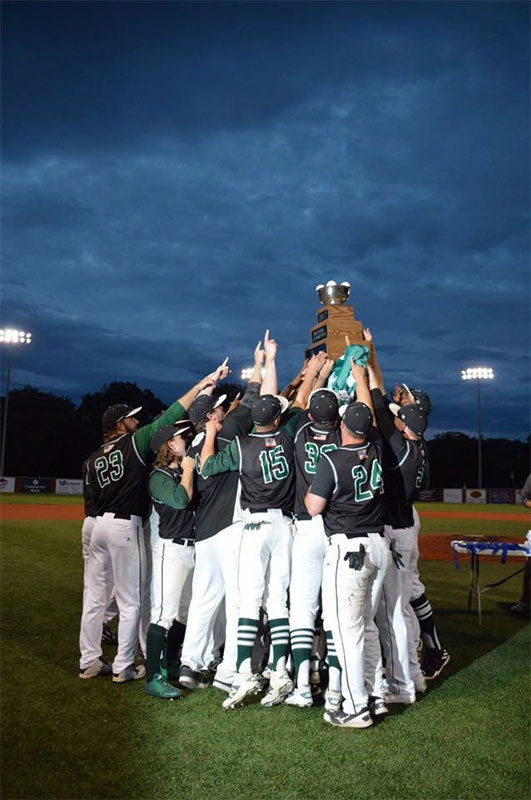It might not be well known, but Slippery Rock had a national champion last spring, and it came from the club baseball team. The team defeated Windsor 1-0 in Pittsburg, Kansas to claim the national championship.
“Honestly, I think people overlook the fact that we have club sports here,” club baseball vice-president and starting catcher Jon Fouts said. “In Icebreakers in class, I always say I’m on the club baseball team, people are like ‘we have a club baseball team?’ it flies under the radar. Winning the national championship not only put us on the map around the country, but to the students here.”
Slippery Rock also went to the NCBA (National Club Baseball Association) Division II world series in 2016, but went 0-2. This year, the team went 5-1 in the World Series, led by world series MVP, starting pitcher Ryan Huey. Huey recorded two wins in 11 2/3 innings pitched, without giving up a single run.
“I actually tried out for the team in 2016 but didn’t make it,” Huey said. “When I first joined the team I said, ‘Let’s win a ring guys’, and everybody knew we had a serious shot to win it.”
Compete they did, after driving to Pittsburg, Kansas last spring, when the team played in six consecutive high-stakes games that would decide the national championship.
“Each game was extremely intense. We didn’t have the biggest crowds, but we knew every game could be our last,” Huey said. “Eight teams from across the country out of the 168 that exist made it. We were one of those and we knew it wasn’t on a fluke, and we knew we had a chance to win it and brought the same intensity every game.”
Obviously, Huey wasn’t the only player who felt the intensity, as center-fielder Zach Moore shared a similar feeling that he had at the World Series.
“It was nuts,” Moore said. “Playing that first game and winning by one run, then we lose the next one and coming back to win four consecutive, against the teams that we did. Especially the second Ohio State game when we were down in the bottom of the seventh, and just fortunate plays helped us win the game– that game was the most intense. It was incredible.”
Moore definitely felt the pressure more than the average player, as he hit the game-winning home run in the championship game versus Windsor. He was one of the only players that contributed heavily on offense, as the team batted .190 throughout the world series.
“It was the epitome of pitching and defense wins championships,” Fouts said. “Those games were indescribable. Those were the six toughest games I have ever played in. All seven innings we knew that we either needed to hold them there, or score some runs, nothing will ever compare to those games.”
Another standout performer for the team was pitcher Stephen McKee. McKee pitched two complete games, and only gave up two earned runs in his 14 innings pitched, and also recorded 20 strikeouts.With a team like this, the more fascinating part of the story isn’t the destination, but the journey they went through.The team is unique, being completely student run, and also has no coaches, which brings the team to have to work harder in spots that most teams don’t.
“The fact that we don’t have a coach saying ‘alright we have to be up at 6 a.m. for practice’, we can’t afford to slack off; you have to put the time and effort in, we won’t succeed if we do,” Fouts said.
Some of the more specific facets of the game are also challenges for club baseball, such as catching and base coaches.
“Fouts calls all the games from his perspective, we don’t have a coach to tell him what to call,” Moore said. “We have kids that are fine with being first and third base coaches, and they make the signs for bunts, steals and hit-and-runs. “
A misconception about club teams is that the competition could be diminished, but Moore was quick to state that the opposite is true.
“It’s very intense competition. The pitching is as good as Division II , you just don’t have as much speed or dip in the curveball, but they are still pumping,” Moore said. “They are all solid players, especially the division one teams like Ohio State and Penn State that we played. They were all good teams, they are just as good as some other DII teams.”
Two players have been drafted straight out of club baseball, Nathan Nowicki in the 19th round in 2003, and Chris Waters in the 16th round the following year. Steve Schmoll made his MLB debut in 2005 after playing for the Maryland club baseball team. With so few players ever appearing in MLB games from club teams, Fouts explained how he thinks that could change soon.
“You have guys that don’t make Division I teams, but now play club baseball, guys that could potentially play in the major leagues and compete,” Fouts said. “Major league scouts looking at club baseball teams are looking at a cheap sign. They are getting quality talent for a reasonable price. You have those 18-year-old guys that are top prospects that want the big bucks, but club baseball guys are like ‘a major league team signed me? I don’t care how much, let’s go play, this is awesome.’ It’s opening up a door for major league scouts to come look at high quality talent that play.”
While the baseball team will lose some players from last season due to graduation, they will never lose the connections they made last spring in Kansas.
“Going out and winning the national championship, we all became brothers that night,” Fouts said. “If you love to play baseball, this team magnifies that.”









